What to expect in the program
The Lawrence Bloomberg Faculty of Nursing is committed to student-centred learning that encompasses the principles of empowerment, engagement, discovery, advocacy, diversity, equity, and knowledge transformation for nursing practice. The full time, accelerated, 2-year Bachelor of Science in Nursing (BScN) program opens the door to a long and rewarding career in health care. Bloomberg Nursing has a long history of educating nurses at the baccalaureate level and is renowned internationally for its educational programs and the quality of nursing research conducted by its faculty members.
The overall objective of the 2-year BScN program is to prepare students with both university and life experience to meet the challenges of the health care system of the future. Students enrolled in the program benefit from opportunities to work with diverse populations and to practice under the supervision of highly qualified professionals in some of the best health care agencies in Canada.
Term One
- Emphasis on theory, research, and practice relevant to care of patients, families and communities.
- Clinical courses introduce students to nursing practice across range of practice environments for two client populations and their families: older persons and persons with mental disorders.
- Clinical practice takes place in hospital and residential care settings
Term Two
- Emphasis on pathophysiology and care of individuals experiencing acute illnesses that require hospitalization
- Clinical practice takes place in paediatric, adult medical-surgical, labour and delivery/post-partum settings.
- Introduction to theories and concepts guiding community health nursing in Canada and internationally.
Term Three
- Introduction to research and scholarship
Term One
- Course work focuses on health system, health policy, leadership, ethics, research and scholarship, theory and practice, and issues in medical microbiology.
- Students complete clinical course NUR460/461 integrating theory, research and clinical practice in relation to the complexity of coping with persistent illness OR Clinical course integrating theory, research and clinical practice in relation to primary health care
Term Two
- Students complete clinical course NUR460/461 integrating theory, research, and clinical practice in relation to the complexity of coping with persistent illness OR Clinical course integrating theory, research and clinical practice in relation to primary health care
- Final course prepares students for independent practice after graduation
Term Three
- Integrative nursing practicum
Students complete an 11-week continuous integrative clinical practicum at the end of year 2. Placements will be chosen in collaboration with faculty in consideration of the student’s future career goals, strengths and challenges.
Program Requirements
All BScN undergraduate courses are compulsory. Withdrawal from any course in the BScN Program requires special permission and will lengthen your time to completion beyond the typical 2 year timeline. Please contact student services for more information. Email: ask.nursing@utoronto.ca
Curriculum Framework
Graduates of the BScN program are socialized to fulfill the professional standards of
nursing and prepared to meet the demands of current nursing practice across a full range
healthcare settings and sectors.
The five curriculum themes reflect what the BScN program seeks to accomplish in graduates’
contributions to the advancement of the nursing discipline and to quality healthcare
overall. Students realize program objectives through their achievement of the clusters of
related program learning outcomes mapped across all courses in the 20-month program.
Graduates of the BScN Program provide safe, effective, equitable, and ethical care that is
relationally and technically sound; reflective of diverse theories, research, and healing practices.
Graduates of the BScN Program are change agents, leaders, and critical and system level thinkers who can translate knowledge from multiple sources within the complexities of varied organizational and
sociopolitical healthcare contexts.
Graduates of the BScN Program demonstrate critical reflexivity and an ethic of care when working with others, helping to re-shape power relations that impede collaborative practices.
Graduates of the BScN Program center compassion and trauma-informed practices in their
therapeutic relationships, advocating for and contributing to culturally safe healthcare.
Graduates of the BScN Program value political engagement, contributing to the betterment of
sociopolitical and other broad circumstances that impact the health and well-being of individuals, groups, families, communities, and populations.
Courses with clinical nursing practice
For those courses with a clinical nursing practice component, the evaluation of clinical performance is on a “PASS/FAIL” basis.
To pass the course, the student must pass both the clinical and classroom components. Normally students will receive a verbal mid-term evaluation and a written final evaluation of their clinical performance from their clinical instructor.
Students who are identified at the mid-term point as being at risk of failing clinical practice, will receive a written mid-term evaluation. Students whose performance is unsatisfactory at any time after the midpoint of the clinical experience, will also be informed in writing.
Study and Work closer to home with the BScN UTM-based program
As of Fall 2026, Bloomberg Nursing is expanding its BScN program to the University of Toronto Mississauga (UTM) campus, welcoming 30 students annually. This new UTM-based cohort will create opportunities for students from diverse communities in the Peel Region and beyond, to study and work closer to home while earning their BScN degree. With clinical and community placements at leading health care organizations in the western GTA and a strong life sciences culture at UTM, Bloomberg Nursing is building a pathway to healthcare careers that reflect and serve the communities of Peel region.
The UTM Cohort
Students admitted to the UTM-based cohort will complete their courses on the UTM campus, their simulation learning on the St. George campus and in future the UTM campus, and their practicum placements at clinical and community sites in the western GTA.
The UTM-based cohort will be connected to the St. George campus community, learning from leading faculty members, having access to Bloomberg Nursing student services as well as research related opportunities such as the Rosenstadt Research Development program.
UTM-based students will also have access to all of the services offered at the UTM campus, including UTM’s Gym: RAWC, Campus Health Care and Accessibility Services.
Prospective Students
Applications to the BScN UTM-cohort will be accepted beginning November 1. Interested applicants can indicate their campus preference when completing their application online.
Interested in being a part of the first BScN UTM Cohort? Find out more information and answers to some frequently asked questions below or contact our student services team at connect.nursing@utoronto.ca
The UTM-based cohort | FAQs
All Bloomberg Nursing BScN students will complete the same program objectives, program learning outcomes, number of clinical hours, and number of courses.
Some courses will be livestreamed – and some course will be in-person on the UTM campus. Faculty and instructional assistants will be available on the UTM campus to support learners.
Some simulation learning may take place on the St George campus while we explore opportunities for simulation learning at UTM. Students in the UTM-based cohort can take the UTM shuttle bus between the UTM and St. George campuses free of charge by showing their valid TCard when boarding. Students can also use public transportation or their own cars to travel between campuses.
Students in the UTM cohort will have the opportunity to select placements closer to home at clinical and community sites in the western GTA.
Yes. Students in the UTM-based cohort will have full access to spaces on the UTM campus including athletics and recreation, library access, health and wellness, accessibility services and more. Students are encouraged to access EagleConnect, UTM’s New Student Transition Support Program which offers online and informative webinars about accessing UTM resources.
All exams for the UTM-based cohort will take place on the UTM campus.
Courses
See yourself in our program
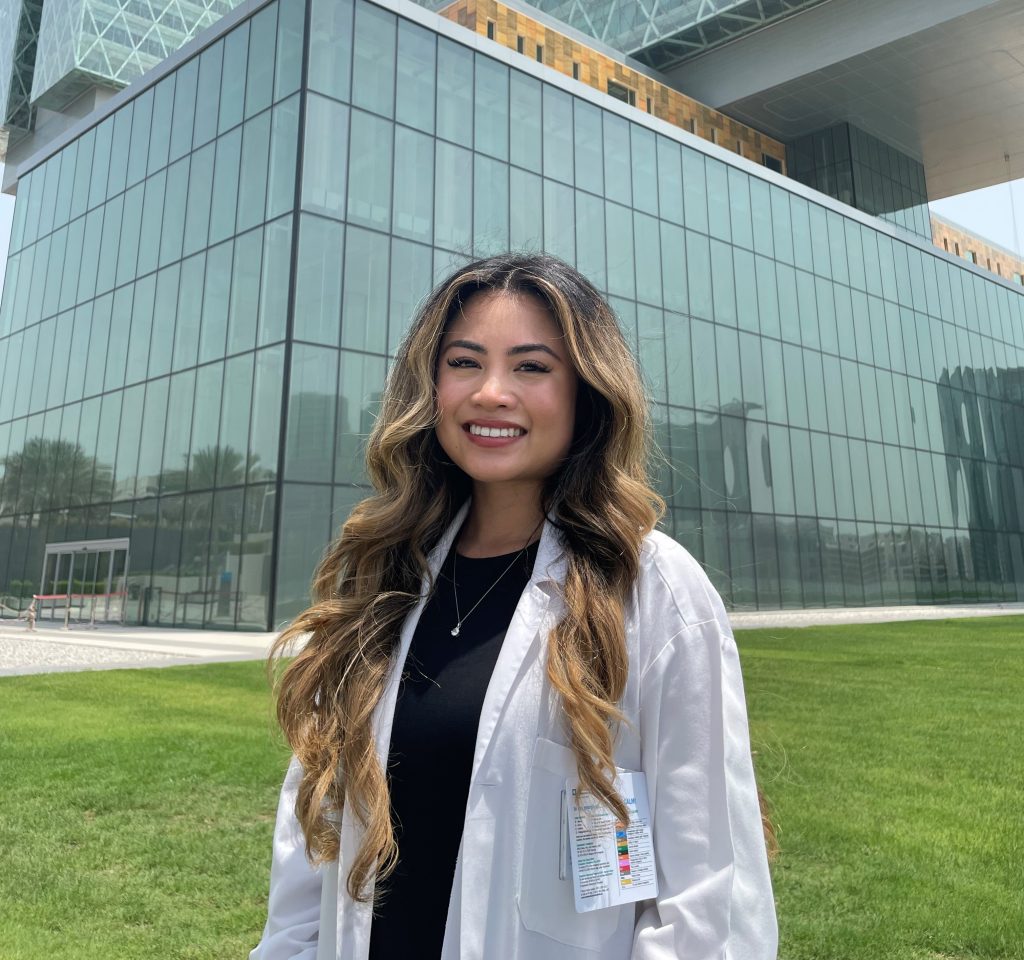
Anjelica Martinez
Summer nursing internship in Abu Dhabi provides unique opportunity to explore international nursing experience
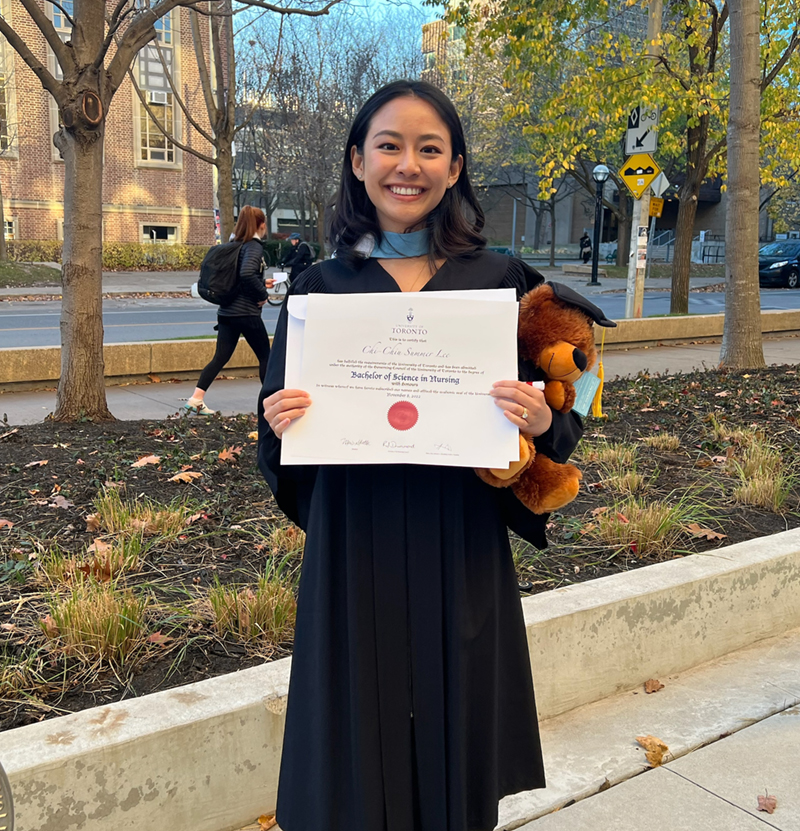
Summer Lee
“We are all in this together” – Nursing grad aims to advocate for future nurses

Jinal Patel and Conor Chiasson
A chance to make a difference – New nursing students share inspiration for joining nursing profession
Latest Testimonials
As a student, my most memorable learning experience took place in a second-year class on reflexive nursing practice. Prior to taking this class, I was unaware of reflexive practice and […]

I chose to attend Bloomberg Nursing because of the number of clinical placements we complete and the access to GTA hospitals as placement options. This made the program stand out […]

Meet our top-tier faculty and instructors
Bloomberg Nursing prides itself on providing our students with expert faculty in the field of nursing innovation and science. You will learn directly from nurses and nurse practitioners with a variety of clinical backgrounds.
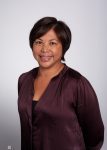
Zoraida DeCastro Beekhoo, RN, MA
Associate Professor, Teaching Stream

Erica Cambly, RN, MN
Associate Professor, Teaching Stream

Charlene Chu, RN, PhD, GNC(C)
Associate Professor
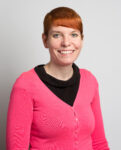
Laura Fairley, RN MN CHPCN(C)
Assistant Professor, Teaching Stream

Mary Ann Fegan, RN, MN
Associate Professor, Teaching Stream
Undergraduate Coordinator, Year 1
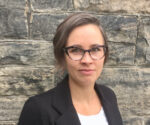
Quinn Grundy, RN, PhD
Associate Professor, Tenure Stream

Lindsay Jibb, RN, PhD, CPHON
Associate Professor
Signy Hildur Eaton Chair in Paediatric Nursing Research

Sarah Johnston, RN, MN
Assistant Professor, Teaching Stream
Undergraduate Coordinator, Year 2 (term)

Joanne Louis, NP, MN
Assistant Professor, Teaching Stream

Shan Mohammed, RN, MN, PhD
Associate Professor, Teaching Stream
Director, MN Program

Heather Thomson, RN, MN, PhD
Assistant Professor, Teaching Stream
Director, Undergraduate Program
Jean Wilson
Assistant Professor, Teaching Stream
Related Programs
Graduate
Master of Nursing
Our Master of Nursing program prepares nurses to be professional leaders in their chosen advanced practice field.
Graduate
Post-Master Nurse Practitioner Diploma
A program designed for nurses who have completed a Master’s degree, preparing them for NP roles.
Graduate
Collaborative Specializations for Master’s and Doctoral Students
Providing a multidisciplinary experience that enhances student expertise in their chosen graduate degree.
Graduate
Doctor of Philosophy
Building leaders in nursing science. The PhD program prepares scholars to lead the way in innovative health care policy, practice, and research.
Graduate
Doctor of Nursing
Thesis-based program. Students learn to identify and investigate a challenge in healthcare or nursing education and design implementation and evidence-based strategies to improve outcomes.